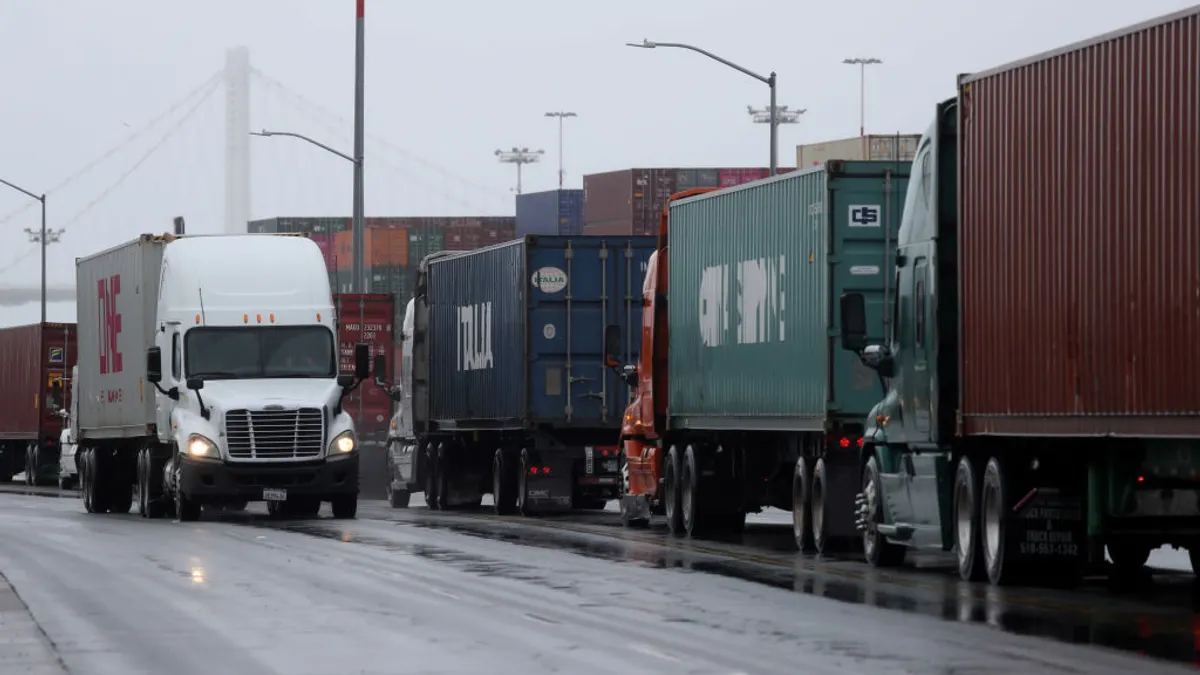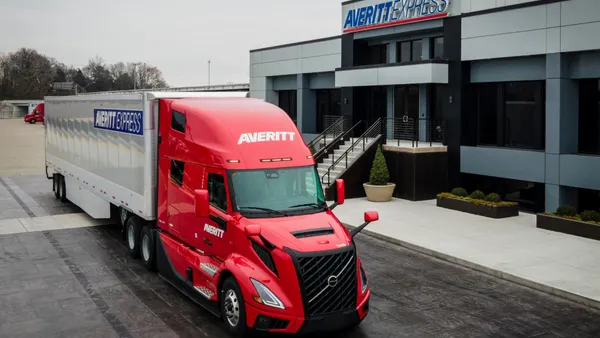Dive Brief:
- The Federal Maritime Commission (FMC) has four recommendations and one action it could take to address supply chain challenges at the ports of San Pedro Bay in California, according to a release Wednesday. "Three of the four identified critical issues and associated remedies will benefit truckers once implemented," an FMC spokesperson told Transport Dive in an email.
- The FMC recommends, "Truckers should be directed to return empty containers to the terminal where they were picked up, allowing them to make dual moves and reduce the number of chassis required." Further, the FMC suggests terminals allow appointment-free returns during slow periods, such as night gates. Some terminals, the FMC noted, are already using these or similar practices.
- Other recommendations concern notices of blank sailings, export cargo receiving timelines and the creation of an advisory board to promote collaboration between carriers, ports and marine terminal operators (MTO). They were developed following conversations with directors at the ports of Los Angeles and Long Beach, CEOs from ocean carriers, marine terminal operators, longshore labor leaders and FMC Innovation Teams.
Dive Insight:
"Equipment returns, and the penalties that [result] from having late returns of equipment for various reasons, has been one of the biggest issues that our members have dealt with," Weston LaBar, CEO of the Harbor Trucking Association (HTA), told Transport Dive.
In the cases of cargo surges, terminal shutdowns or other events, HTA members can receive six- or seven-figure detention and demurrage bills.
"That's huge," LaBar said. Currently, truckers are booking appointments to return empty equipment to an ocean carrier. But if there are multiple terminals at which the carrier could dock, the trucker doesn't know which will allow for container return, and then makes multiple appointments to ensure one is correct. This results in unused appointments, clogging the schedule up artificially.
If drivers know exactly where they can return equipment, the appointment process will be more streamlined, LaBar said. And if the driver has an import appointment at the same terminal, it can be booked in a dual transaction, increasing driver productivity. That would, in turn, reduce port congestion. Instead of having one truck in line to pick up and one to drop off, one truck can do both. It's cheaper for the customer that way, too, LaBar said.
"The more efficient you make that trip, the better it is for everybody," he said.
The other FMC recommendations are:
- "Notice of terminal gate closures should be given no less than three days, and preferably seven days, before gate closing. At no time should a closure occur mid-shift."
- "Notice of blank sailings should be given not only to beneficial cargo owners (BCOs), but also posted prominently on a carrier’s website, at least seven days in advance. Notice of bypassed ports should be posted at least 72 hours in advance." The FMC also said, "It is vital that ocean carriers communicate their plans in a timely way to all parties who, in turn, coordinate their businesses around cargo availability. Notification should be made available on carrier websites, as well as direct notification to shipper customers, to accommodate truckers and other parties."
- "Carriers and terminals should immediately seek to collaborate regarding Export Cargo Receiving Timelines with the goal of better coordinating their interaction." The FMC noted more than seven days of notice for changed earliest receiving dates (ERDs) would be better for inland-based exporters.
- "That the Commission consider an Advisory Board consisting of ports, carriers, and MTOs in the interest of fostering and promoting greater collaboration across those three industry sectors."
The recommendations stem from Fact Finding 29 discussions, in which the FMC is taking a regional approach to mitigate freight challenges that arise due to the pandemic. "The dray haulage industry was represented by several senior executives from the major trucking companies servicing" the California ports, the FMC spokesperson said. FMC Commissioner Rebecca Dye will engage with the Port of New York and New Jersey and the Port of New Orleans, according to the release.
Dye believes all parties who contributed to the fact-finding discussion "will work cooperatively to implement them," the spokesperson said, "especially as commercial solutions are always preferable to regulatory prescriptions." Because they are recommendations, they don't have an enforcement mechanism.
"I hope that the other stakeholders take a look at this and take it to heart," LaBar said.








